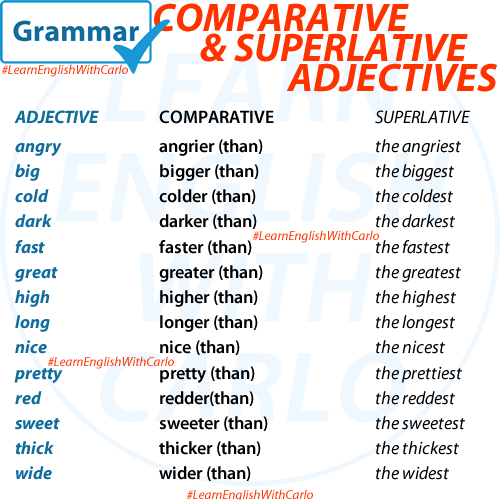Comparative and superlative adjectives are essential tools in English grammar for comparing and expressing degrees of qualities or characteristics. This post will clarify these concepts with clear definitions, examples, and practical applications.
GRAMMAR – Comparatives & Superlatives
Comparative Adjectives
Definition: Comparative adjectives are used to compare two things or people and indicate which has a higher degree of a particular quality.
Formation:
- For most adjectives: add “-er” to the adjective (for short adjectives) or use “more” before the adjective (for longer adjectives).
- For adjectives ending in “y”: change the “y” to “i” and add “-er” (e.g., happy → happier).
- For irregular adjectives: use completely different words (e.g., good → better, bad → worse).
Examples:
- Short adjective: fast → faster
- The cheetah is faster than the lion.
- Long adjective: beautiful → more beautiful
- Paris is more beautiful than London.
- Adjective ending in “y”: happy → happier
- She seems happier today.
- Irregular adjectives: good → better, bad → worse
- Her performance was better than expected.
- The weather today is worse than yesterday.
Superlative Adjectives
Definition: Superlative adjectives are used to compare three or more things or people and indicate which has the highest degree of a particular quality.
Formation:
- For most adjectives: add “-est” to the adjective (for short adjectives) or use “most” before the adjective (for longer adjectives).
- For adjectives ending in “y”: change the “y” to “i” and add “-est” (e.g., happy → happiest).
- For irregular adjectives: use completely different words (e.g., good → best, bad → worst).
Examples:
- Short adjective: fast → fastest
- The cheetah is the fastest animal on land.
- Long adjective: beautiful → most beautiful
- Venice is one of the most beautiful cities in the world.
- Adjective ending in “y”: happy → happiest
- She is the happiest person I know.
- Irregular adjectives: good → best, bad → worst
- This is the best restaurant in town.
- That was the worst movie I’ve ever seen.
Key Differences
- Comparative: Used to compare two things or people.
- Superlative: Used to compare three or more things or people.
- Formation: Follow specific rules based on adjective length and irregular forms.
Practical Applications
- Use comparative adjectives to indicate differences between two items.
- Use superlative adjectives to highlight the highest degree of a quality among a group.
Conclusion: Understanding how to use comparative and superlative adjectives effectively allows you to express comparisons clearly and accurately in English. Practice using these forms in sentences to improve your language skills and communicate with precision.


1 comment
First thangs. I need more positive comparative and superlative .